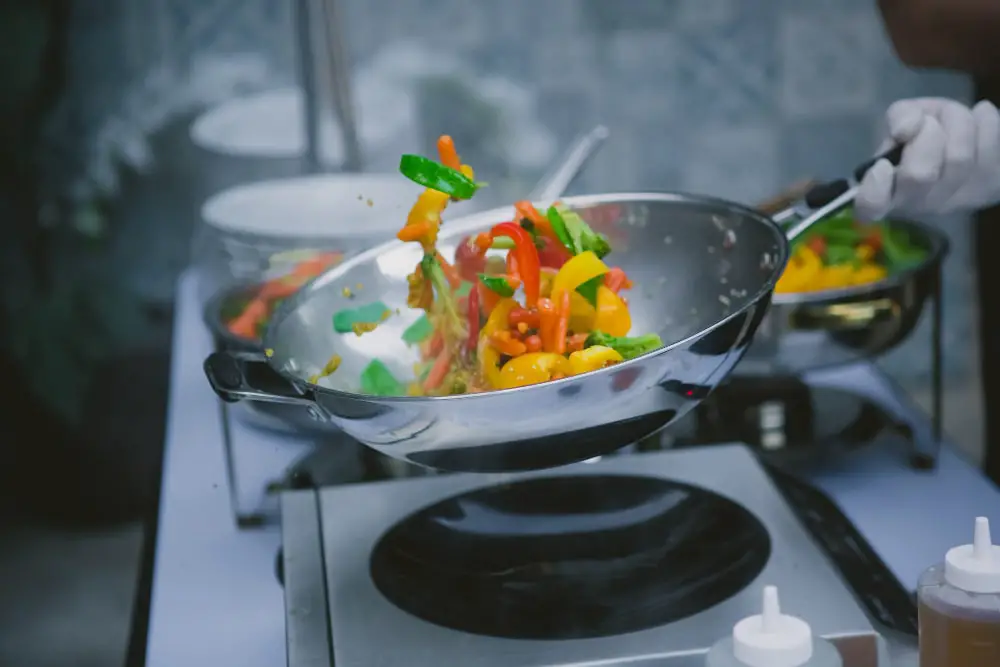This post contains affiliate links. When you buy through our links, we may earn a commission.
A wok is among the kitchen instruments that tend to be busy in the kitchen. Whether you use a gas or electric stove, Woks tend to acquire rust after using it several times. Most Woks made from cast iron or carbon steel tend to rust fast compared to the Woks made from Aluminum.
To prevent easy rusting in woks, you recommend that you season the Wok before you start cooking. In this article, you will learn how to clean a wok so that you keep it clean and efficient.
Cleaning a New Wok Before Using It
Although you have unwrapped it, it looks new, and it doesn’t mean that it is hygienic. The coating might have a superficial chemical that is meant to protect the Wok from rusting.

As a result, you need to make sure that you clean it to remove the factory oil on its surface. Factory oil is usually used to protect the Wok from rusting and humidity during storage and transport. So, how do you remove the residues from the Wok surface at the very beginning? Below are the steps.
- Put hot salty water in your sink
- Using a scouring pad, scrub the outer surface of the Wok
- Thoroughly rinse the Wok, ensuring no residue remains
- With a clean, dry towel, wipe the Wok Dry
- To ensure all water is out of the work, place it on the stovetop at medium heat
After you are done, it’s evident that the manufacturer’s oils and residues have been eliminated. You can now assemble your ingredients and start preparing meals with Wok.
The more often you clean the Wok, the better it would prevent the intense accumulation of residues on the Wok. Thanks to the non-sticky woks because even fats cannot stick to the surface of the Wok.
Use Good Oils to Avoid Burning Your Wok
You wouldn’t like your Wok to have that dark appearance whenever you are done cooking. This means the oils you use in cooking should have a high smoking point to set high temperatures without the oils burning.
Oils with a high smoking point won’t burn even at high temperatures, which prevents your Wok from burning and becoming black on its surface. Before you learn how to clean Wok, know the best oils to use.
Some of the best oils that you can use in your Wok without ruining it include:
- Peanut oils
- Canola oils
- Lard or Pork Oil
- Sunflower Oil
The Cleaning Process
Cleaning a wok may seem like a simple task, but it could compromise the efficiency and strength of the Wok if not done correctly. Debris that remain on Wok due to improper cleaning leads to quick rusting of the Wok. Even distribution of the heat is compromised when debris remains on the Wok.

Before cleaning, refer to the care instructions that come with Wok’s manual. Aluminum, stainless steel, and copper woks can all be placed in the dishwasher without ruining them. Cast iron needs some extra care to prevent removing the seasoning from its surface. Follow the below steps on how to clean Wok to clean your work appropriately.
Rinse Wok in warm water. You can use hot water if you want. The trick here is to soften all the dirt so that it easily detaches from the surface to clean the Wok. With slight scrubbing, all the debris is removed.
When you use boiling water, the aim should be to remove any germs that might contact the Wok. Most people use hot water when the Wok has stayed with the dirt for some days, and molds have started to form.
Using the wok brush or a sponge, you can remove the debris from the Wok by scrubbing gently. Don’t use abrasive materials because they reduce the Wok’s thickness, making it burn food even at slightly high temperatures. Abrasive materials also remove the seasoning you have created, so just use a wok brush or a sponge.
Rinse Off all the debris after you are done cleaning. You will realize that debris is plenty of the surface of the Wok. Rinsing debris is a way of ensuring that no dirt will remain on the surface of the Wok.
After rinsing, you should then look for a dry towel and wipe the Wok so that you keep it completely clean. Wiping the Wok guarantees you that there will be no single dirt remaining.
The moment you are done wiping, turn on your stove and make it a medium-heat level so that you heat the Wok and dry any remaining moisture. Leaving moisture on the Wok can cause rusting, so make sure it is scorched before you even store it. If you don’t have any use of the Wok in the coming week or so, apply some thin amount of oil layer so that you prevent it from rusting.
How to Season Your Oil?
Seasoning of the Wok is necessary to remove the debris and store it clean. While most people have different ways to season a wok, most people just season Wok using salt and stovetop. Just put the salt in the Wok. Place the Wok on the stovetop and light it.
With medium-heat size, make sure you heat the Wok for up to 20 minutes as you stir the salt. Remove the Wok from heat and dump the salt. You can rinse after the Wok has cooled down. Many people apply oil to form a thin layer before storing the Wok. This layer is meant to prevent the Wok from contacting any corrosive material that could ruin it.
Conclusion
Cleaning a wok is not that hard, but if you want to make your work easier, clean the Wok regularly. Regular cleaning helps prevent the buildup of debris inside, which might make cleaning a tedious task.
Always make sure you have outstanding cleaning materials that will efficiently clean without ruining the quality of your Wok. The use of abrasive cleaning materials is not suitable for your Wok because it will ruin its strength.
